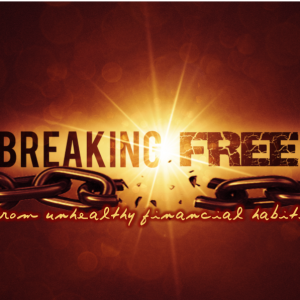Paying It Forward
1. Share a story about a time when you were a child and you bought or made a special gift for a parent or loved one. How did it make them feel?
2. Proverbs 10:16 (NLT): “The earnings of the godly enhance their lives, but evil people squander their money on sin.” How does this verse recommend we use our money? How do people squander their money? On Sunday, we talked about investing in eternity through investing in personal, spiritual growth. What are some practical ways we can invest in our character?
3. Proverbs 23:23 (CEV): “Invest in truth and wisdom, discipline and good sense, and don’t part with them.” When we are told to buy and hold onto truth, God is reminding us not to forsake His truth for any worldly benefit. What are some ways you have seen people abandon the truth? 2 Peter 3:18 (LB): “But grow in spiritual strength and become better acquainted with our Lord and Savior Jesus Christ.” We are to strive to know Christ more fully to become more like Him. What routines and rhythms would help you become more like Christ?
4. Hebrews 10:24 urges us to think of ways to encourage one another with outbursts of love and good deeds. How can you do that very practically this week? When we use our resources to build relationships with other believers, it reveals we are in God’s family, promotes unity and is a witness to those who don’t yet believe. What can we do to strengthen unity? How could the way we treat fellow believers impact a non-believer?
5. Ecclesiastes 11:1-2 (MSG): “Be generous: Invest in acts of charity. Charity yields high returns. Don’t hoard your goods; spread them around. Be a blessing to others. This could be your last night.” What does this say about serving others? What are some practical reasons to serve today? Why is it important to allow God to use us to help those in need? How can you live this out this week? How do these actions reveal the character of God?
6. Luke 16:9 (NIV): “Use worldly wealth to gain friends for yourselves, so that when it is gone, you will be welcomed into eternal dwellings.” What eternal investment can we make with our material resources? What kind of welcome might believers who have invested in others expect to receive later in heaven? How do you think those who have led others to faith in Christ might be greeted in heaven by those they have helped save?
7. The Apostle Paul writes in 2 Corinthians 9:13 (GN), “And because of the proof which this service of yours brings, many will give glory to God for your loyalty to the gospel of Christ, which you profess, and for your generosity in sharing with them and everyone else.” How do you think God views believers’ generosity to missions to spread the Good News of Christ? How have you spread the Good News in your community through generosity and sharing? What is God nudging you to do?
8. Proverbs 3:9 (LB) declares: “Honor the Lord by giving him the first part of your income and he will fill your barns…and overflow your barrels.” How does giving God a tenth of your income increase your dependence on Him? How does this show the importance God has in your life? God specifically says that He wants the first part of your income. Why do you think He asks that you pay Him first? Would a God who accepts a few scraps tossed at the end of the month be worth serving?
Dollars and Sense
1. Who taught you how to manage money? What were some foundational principles you learned from them? Do you feel you are financially healthy right now? Why or why not? What would you change if you could? How is God being honored in how you are handling your finances?
Read: Matthew 25:14-30
2. Who owned the wealth or property described in v.14? In this parable, who does the man going on a journey represent, and who do the servants represent? Why might it be challenging for some to accept the concept that all our possessions belong to God?
3. According to v.15, what process did the man going on a journey use to decide how to allocate his money? In the story, each servant received a different amount, but each servant received something. In what ways is this an analogy to our lives today if we consider that the servants in this story represent us? What does it mean to be a steward of what God has entrusted to you?
4. In v.19-20, what objective does the master of the servants have? Who does the servant in v.24-25 blame for his behaviour? What are current examples of people blaming other individuals or institutions for their own failures? How are you impacted by the fact that God will hold you accountable for how you stewarded His resources?
5. What does v.27 reveal about the master’s expectation of the servant with regard to stewarding his (the master’s) money? What are we really doing when we “bury” something? When we think of the three servants, which one is more likely to do nothing with what God gave him? Why do you think that is so? Do we have to be a superstar to make a contribution with our talents? What problems do you see with “playing it safe”? Why do so many sit on the sidelines?
6. In v.25, what reason did the third servant give for not investing the master’s money? Why is fear the opposite of faith? What are some manifestations of fear in our lives? What happens when we give in to fear? Talk about the kind of fears that can bury our talents. How can we move against those fears? What was the master’s reaction to the third servant in v.28-29?
7. We’ve all the heard the expression that if we don’t use it, we’ll lose it. It’s a universal law. How is the story of the third servant an example of that truth? Why do you think some people seem to get less and less in life? What does God promise us in Hebrews 13:21?
8. As a reward for their wise management of his resources, the master offered the first two servants affirmation, promotion, and celebration (v.21). Why do you think both these servants earned the same reward? How does this verse encourage you to be a better steward of all that God has given you?




